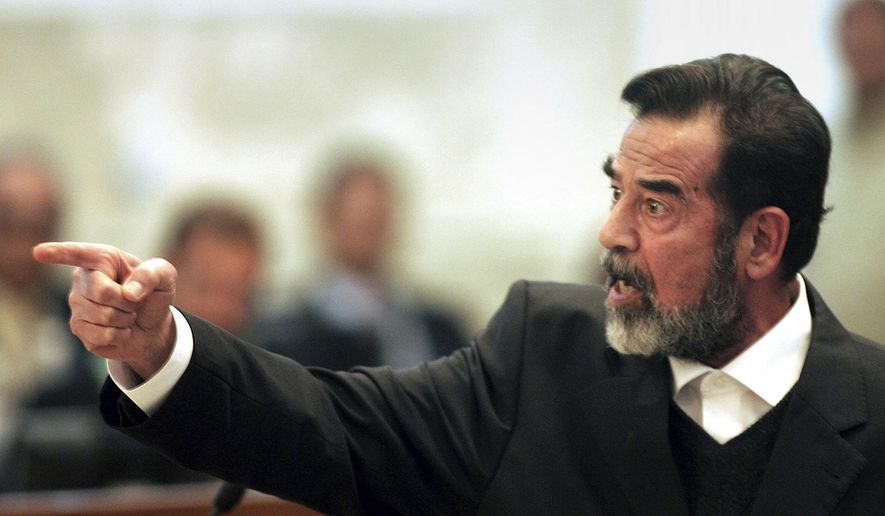BEIRUT — The late Iraqi leader Saddam Hussein’s great-nephew has no links with the Islamic State group but was sent back to Iraq as part of a political deal with Lebanese authorities, his lawyer said Sunday.
Bushra al-Khalil told The Associated Press that her client, Abdullah Yasser Sabaawi, was living in Yemen in June 2014, when IS fighters massacred hundreds of Iraqi troops in central Iraq. She said Lebanese authorities handed over Abdullah to Iraq on Friday despite the fact that he had been registered as a refugee in Lebanon and denies any link with the 2014 massacre.
IS captured an estimated 1,700 Iraqi soldiers after seizing Saddam’s hometown of Tikrit in 2014. The soldiers were trying to flee from nearby Camp Speicher, a former U.S. base just outside the northern city. IS later posted graphic images of gunmen shooting the men dead after forcing them to lie face-down in a shallow ditch.
Abdullah is the grandson of Saddam’s half-brother Sabaawi Ibrahim who was sentenced to death by an Iraqi court in 2009 and remained in prison until he died of cancer four years later. Abdullah’s father, Yasser, is in prison in Iraq, al-Khalil said.
Lawyer Al-Khalil, who defended Saddam during his trial in Baghdad before he was hanged in December 2006, said Abdullah left Iraq in 2003 at the age of eight following the U.S.-led invasion and moved to Yemen where he was given Yemeni citizenship after his family was stripped off its Iraqi nationality. She added that the first time Abdullah left Yemen was in late September 2014, three months after the killings, moving to Jordan.
She said the young man moved to Lebanon in 2019 and asked for political asylum hoping to get resettled in Britain to marry an Iraqi woman. Al-Khalil said Abdullah was detained several months ago and was questioned by authorities who found no proof against him being a criminal.
SEE ALSO: Taliban bars Afghan women from going to gyms, public baths
Al-Khalil said that she had given Lebanese authorities all the documents proving that Abdullah had not left Yemen until September 2014 where he was a university student at the time.
“The handover was part of a deal” between Lebanese and Iraqi officials, al-Khalil said adding that since Abdullah is a Yemeni citizen he was not supposed to be handed over to Iraq.
Al-Khalil said she studied Abdullah’s case and found that what was used as evidence against him were claims by two people who said they saw him in videos released by IS militants taking part in the killings.
“My conscience would not allow me to defend a person who took part in a massacre,” al-Khalil said, adding that had he been a criminal she would have refused to defend him.
Iraq’s new Prime Minister Mohammed Shia al-Sudani issued a statement Saturday praising Iraq’s police for repatriating Abdullah “and bringing him before the justice of the Iraqi judiciary to get his just punishment.” It added that Abdullah “was indicted for his participation in the murder of our innocent martyrs from the Speicher base in 2014.”
Al-Khalil said she last saw Abdullah in late October at a detention center and quoted him as telling her “I am ready to do anything but I don’t want to be handed over” to Iraq. She said that the handover took place during the political vacuum in the country with no president elected and a government with no full powers running affairs in Lebanon.
Asked is she fears he could be executed in Iraq, al-Khalil said “of course.”
Iraqi forces arrested scores of men allegedly linked to the massacre after retaking Tikrit in 2015. Since then dozens of men were condemned to death and executed.




Please read our comment policy before commenting.